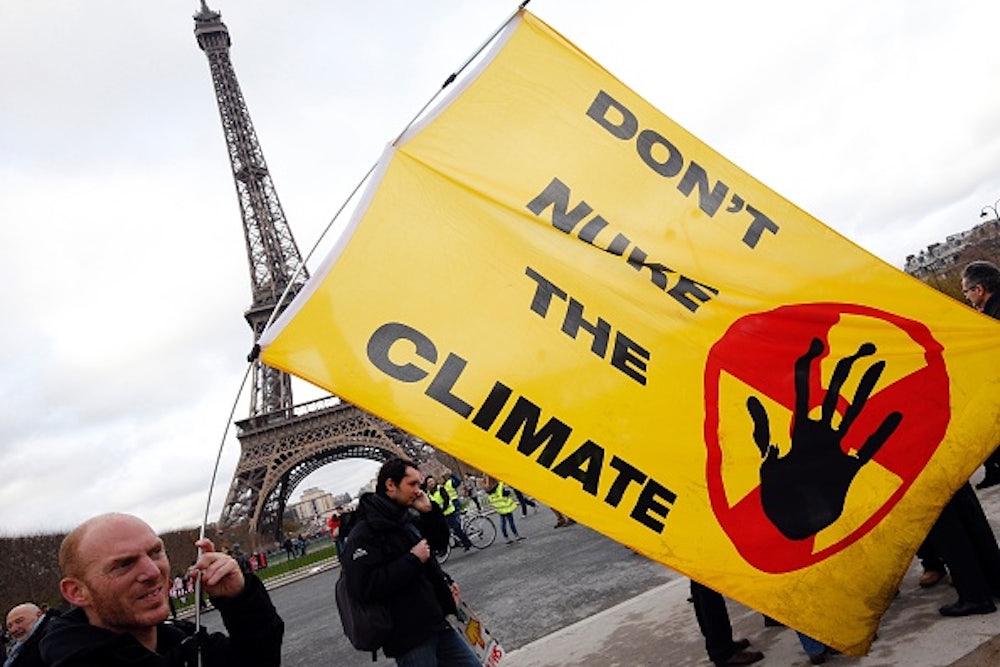Symbolically, at least, the Paris climate-change conference that ended on Saturday is a landmark. It is, as French President Francois Hollande grandly dubbed it, “the first universal climate agreement in history.” For the first time, essentially all countries have professed concern about global warming and pledged they’ll do something to try to curb it. For the first time, essentially all countries have endorsed the notion that the world has more to lose by resisting a shift to a lower-carbon economy than it does by embracing that shift.
But a massive reduction in greenhouse-gas emissions would be monumental, volatile, and dislocating. It would create new economic winners and losers. Which is why there is a big difference between inking the first truly global climate pact and solving global warming. When the Champagne corks stop popping in the French capital, a hangover is going to set in. As hard as it was to get diplomats from 195 countries to agree to a 31-page climate accord after two weeks holed up in a conference center on the outskirts of Paris, it will be infinitely more difficult to get the global economy to cough up the trillions of dollars that would be necessary to meaningfully curb greenhouse-gas emissions. Solving global warming is mostly about redirecting private capital: from old-energy technologies to new-energy ones, from mature economies to young ones; from proven business models to innovative ones. The Paris agreement sketched out a process for further action that may end up helping unleash that money. That will be its real test.
The accord does get points for honesty. It notes that, though all the countries expected to sign it have proffered plans to constrain carbon emissions, those plans don’t add up to anything approaching what most scientists say is necessary. The plans, if they’re realized, would yield global greenhouse-gas emissions totaling some 55 gigatons in 2020 — roughly 40% higher than the 40 gigatons said to be necessary to prevent average global temperatures from rising more than 2 degrees Celsius above pre-industrial levels, the level most scientists have identified as a threshold beyond with dangerous consequences would occur. No matter. Diplomats being diplomats, the Paris agreement articulates a target even more aggressive than one the world thus far has missed. It says countries should do enough to curb their emissions so that, together, they prevent global temperatures from rising more than 1.5 degrees above pre-industrial levels.
Whatever progress countries make in decarbonizing their economies will be a matter of money. On this front, too, the Paris agreement overflows with aspiration. Rich countries have failed to muster anything approaching a collective $100 billion in annual aid to developing nations that, at a 2009 climate conference in Copenhagen, they promised to help mobilize. And yet the Paris agreement calls on them to write even bigger checks. It “strongly urges” them to follow through on their earlier $100 billion annual commitment. And it says that, before 2025, the world will establish a “goal” of an even bigger annual financial number.
This mushiness is everywhere evident in the Paris agreement: in equivocal calls for periodic reviews of nations’ progress toward their carbon-cutting goals; in soft-pedaling the question of how much developing countries really will be pressured to do to constrain their own emissions; and, most of all, in the agreement’s inability to force any country to produce the emission constraints it has promised.
And yet, for its many and massive weaknesses, the Paris climate accord goes further than any previous diplomatic effort to tackle the thorniest environmental problem the world has ever seen. It outlines a timeline for steadily tougher carbon reductions. It creates a structure designed to name and shame countries that don’t do what they’ve pledged. Most important, and most difficult, it sets in motion a process of additional diplomatic meetings intended to yield financial tools to unlock really massive amounts of corporate low-carbon capital.
It is those discussions, far more than the Paris agreement itself, that will determine whether the world has gotten serious about addressing climate change. Multinational companies want nothing so much as certainty, and in the lead-up to Paris many of the biggest of them called for a Paris agreement that clarified the degree of climate protection that the world will expect them to help achieve. They didn’t get that clarity. But they got a strong indication that they’ll be expected to take climate change into account in all the global markets in which they do business. What’s most worth watching in the coming months will be the inevitable, and high-stakes, fight over the specifics.
